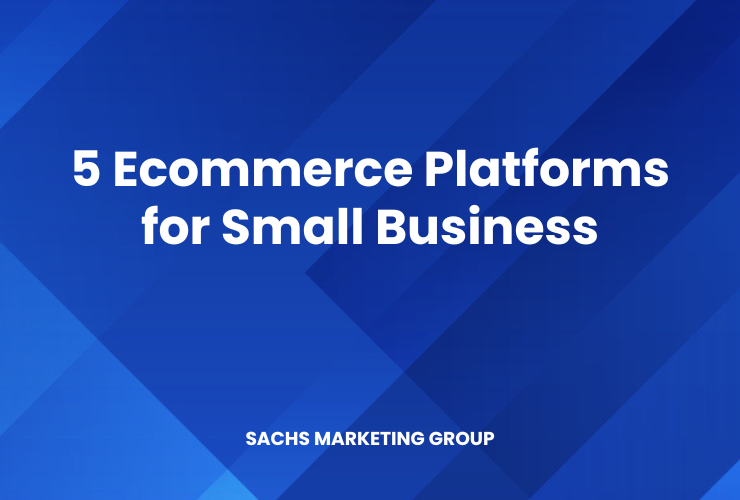Choosing the best ecommerce platform for small businesses requires evaluating factors like scalability, integrations, customer service, pricing, and user-friendly interfaces. It’s all about finding the platform that can support your unique business needs and growth trajectory.

As a small business owner, you may feel overwhelmed by the countless ecommerce platforms available today. You need a solution that aligns with your business needs, customer base, and budget.
The ideal ecommerce platform should provide easy product management, a secure checkout process, and seamless integrations with your existing systems. Taking time to research and choose the best ecommerce platform will set the foundation for your online success, driving sales and allowing you to focus on growing your business. As a full-service digital marketing agency, we work with a variety of small businesses with ecommerce websites, so we thought we could help provide an overview to help you find the best ecommerce platform for your needs.
To help you get started, we’ve gathered five of the best ecommerce platforms for small business.
Overview
What is an ecommerce platform?
An ecommerce platform is a software application that enables businesses to manage their online sales operations. It offers essential features such as the capability to create product pages, cart management, payment processing, inventory management, and more. In some cases, an ecommerce platform will offer thousands of apps that help you extend the functionality of your website or integrate with other platforms.
In addition, some ecommerce platforms offer website templates or themes that can help you expedite the web design and development process. By following these ecommerce website design tips, you can customize these designs to fit the needs of your business.
With an ecommerce platform, small businesses can access the vast online market with minimal fuss.
Ecommerce platforms for small business
There are some great ecommerce platforms available today. Finding the right one requires you to define what is most important for your small business.
Choosing the best ecommerce platform for your small business involves selecting a solution that meets your unique operational needs, integrates seamlessly with your systems, and offers a user-friendly experience for your customers. This decision significantly impacts your online sales, customer satisfaction, and overall business growth, making it an essential aspect of your digital strategy.
Here are five of the best ecommerce platforms for small business:
1. Shopify
Shopify is an industry-leading ecommerce platform that provides everything a small business needs to start and scale an online store. As a cloud-based, hosted solution, it offers remarkable ease of use and flexibility, with intuitive drag-and-drop store builders that require no coding skills. With Shopify, businesses have access to over 70 professional themes to customize their store’s appearance, and it supports over 100 different payment gateways for a seamless checkout experience.
One of Shopify’s significant advantages is its robust App Store, offering over 8,000 Shopify apps for extending your store’s functionality, from SEO tools to inventory management solutions. Shopify’s tiered pricing structure allows small businesses to start with a basic plan and upgrade as they grow. Their plans include hosting, a free SSL certificate, and 24/7 customer support.
Shopify also enables omnichannel selling, integrating seamlessly with various social media platforms and online marketplaces like Amazon and eBay. Plus, it offers Shopify POS for businesses that operate both online and brick-and-mortar stores. It’s no wonder that Shopify powers over 1.7 million ecommerce websites.
2. WooCommerce
WooCommerce is a free, open-source ecommerce plugin built for WordPress, the world’s most popular content management system. Ideal for small businesses already utilizing WordPress, WooCommerce allows for unlimited customization options, given you have the necessary technical knowledge or resources.
WooCommerce supports a broad range of extensions for payment processing, shipping, taxation, and more. It integrates seamlessly with hundreds of solutions, making it a flexible choice for many businesses. While it’s free to use, costs can add up with paid extensions, premium themes, and web hosting services.
One notable strength of WooCommerce is its SEO capabilities, benefiting from the rich SEO features of WordPress. It’s a good fit for businesses aiming for content-rich ecommerce sites, given its robust blogging features.
3. BigCommerce
BigCommerce is another top-tier ecommerce platform aimed at businesses of all sizes. Like Shopify, it’s a hosted platform, which means it takes care of the technical aspects, allowing business owners to focus on running their online store.
BigCommerce stands out for its built-in features. It offers a suite of sales tools like an integrated cart, native subscription sales features, and support for multiple currencies. Its strong SEO features and integration capabilities with leading marketplaces, social media platforms, and offline point of sale systems make it a versatile choice.
The platform provides a range of customizable templates, ensuring your ecommerce store can be unique and in line with your brand. It offers 24/7 customer support, but it has a steeper learning curve compared to Shopify and WooCommerce.
BigCommerce operates on a tiered pricing model like Shopify. While it may seem pricier at first, the wealth of built-in features could potentially save businesses from purchasing numerous add-ons, as might be the case with other platforms.
4. Squarespace
Squarespace is a highly regarded ecommerce platform known for its award-winning design templates and sleek aesthetic. Built with the needs of creative industries in mind, it’s the ideal choice for small businesses looking to create visually stunning online stores with an emphasis on design, images, and branding. A crucial advantage of Squarespace is its simplicity and ease of use; even those without technical skills can create professional-looking sites.
Squarespace provides robust ecommerce capabilities, including unlimited product listings, inventory management, secure payments, customer accounts, flexible discounts, and digital gift cards. It supports various payment options, including Stripe, PayPal, and Apple Pay, to provide a seamless checkout experience for customers.
While Squarespace is not exclusively an ecommerce platform, its ecommerce capabilities have significantly improved over the years, making it a viable choice for small businesses that prioritize design and ease of use. However, it’s worth noting that while its templates are highly customizable, it may not provide the same level of flexibility or advanced features as platforms explicitly built for ecommerce.
5. Wix
Wix is a user-friendly ecommerce platform perfect for small businesses. It’s an ideal choice for businesses that prefer to start with a simple platform and gradually scale up as they grow. It provides a drag-and-drop website builder, making it incredibly easy for business owners without technical expertise to create professional and functional online stores.
The platform offers various ecommerce features, including product galleries, customizable product pages, multiple payment options, coupons and discounts, and a secure checkout process. One of Wix’s standout features is its app market, which allows businesses to add more functionality to their online store, such as email marketing tools, live chat software, and customer reviews.
Wix also offers mobile optimization, ensuring your online store looks great on all devices, which is crucial in today’s mobile-driven ecommerce landscape. One potential drawback is that Wix’s ecommerce features may not be as robust or scalable as other dedicated ecommerce platforms. However, its ease of use, affordability, and customization features make it a strong contender for small businesses looking to establish their online presence.
Working with an ecommerce expert
Partnering with an ecommerce expert can optimize your online store’s performance. They can help choose the most suitable platform, customize the design to suit your brand, integrate necessary plugins, and enhance SEO to increase visibility.
FAQs
Which online platform is best for small business?
The best ecommerce site for a small business depends on the business’s unique needs. However, Shopify and WooCommerce often top the list as the best ecommerce platforms due to their user-friendly interfaces, scalability, and extensive integrations.
Which ecommerce platform is best for beginners?
For beginners, Shopify and Wix are two of the best ecommerce platforms. Shopify stands out for its comprehensive ecommerce features and extensive app marketplace, while Wix is known for its user-friendly interface and drag-and-drop website builder, making it incredibly easy to set up an online store.
Is Shopify worth it for a small business?
Yes, Shopify is worth it for a small business. It offers an easy-to-use platform with robust ecommerce capabilities including inventory management, secure payments, and analytics. With various pricing options, scalability, and a wealth of plugins and themes, Shopify can effectively support a small business’s growth.
What is the easiest ecommerce site to use?
The easiest ecommerce site to use can depend on individual needs and technical expertise. However, platforms like Wix and Shopify are often recognized for their user-friendly interfaces. Wix’s intuitive drag-and-drop builder is ideal for beginners, while Shopify’s straightforward and clean dashboard simplifies the process of setting up and managing an online store.
Need help with your ecommerce site?
Are you feeling overwhelmed by the choices and technicalities of setting up an ecommerce site? Sachs Marketing Group can help!
We understand that choosing the right ecommerce platform can be overwhelming when you’re also busy running your business. Our team has years of experience using ecommerce platforms and will be happy to help guide you toward the best platform for your needs. As a full-service digital marketing agency, we can also bring helpful insight regarding how one platform might be better for SEO than another.
Contact us today to learn how Sachs Marketing Group can help develop or improve your ecommerce website for your small business.
Conclusion
Choosing the right ecommerce platform for your small business is a vital step toward successful online sales. With options like Shopify, WooCommerce, BigCommerce, Squarespace, and Wix, you can find a platform that aligns with your business needs. Don’t hesitate to reach out to an ecommerce expert for guidance tailored to your specific situation.
Contact us today to get the conversation started!











